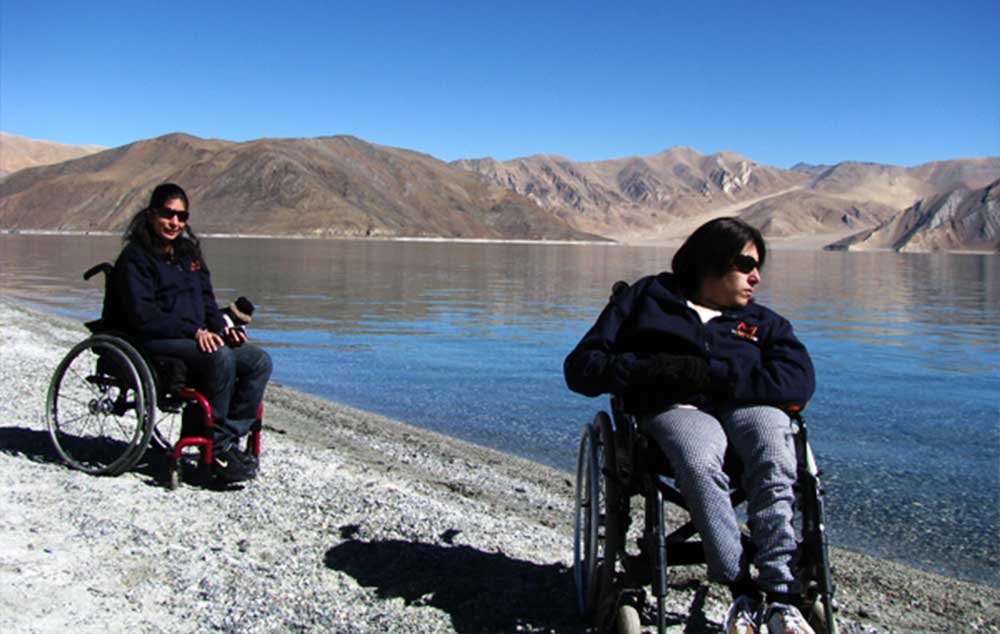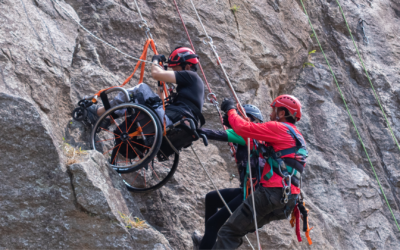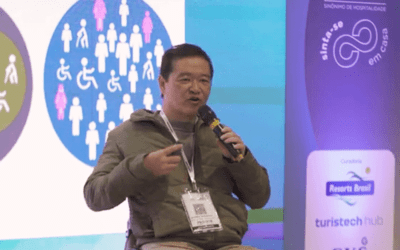
Wheelchair vacations in wonderful places in India
They make up nearly 20 per cent of our population. Here are those who’ve made tourism accessible for the disabled
In 2010, the Ministry of Tourism released some figures for hoteliers to chew on — 18.11 per cent of the population (186 million folks) stand to benefit from accessible travel, a phrase used to describe suitable travelling conditions for persons with disability (PWDs).
This includes everything from toilets to availability of assistants who can communicate in sign language. They even issued guidelines to the Archeological Survey of India and fourand five-star hotels on how to be accessible.
However, the ground reality is far from perfect in most tourist-friendly locations. Here are some service providers who make accessibility their mainstay.
Travel another india
Gouthami, who goes only by her first name, started Travel Another India (TAI) in 2009 and, a year later, tied up with The People’s Action Group for Inclusion and Rights, to start Himalaya on Wheels that tailor-made holidays in Ladakh for the wheelchair-bound.
Shivani Gupta (a Hellen Keller Award recipient who was rendered wheelchair-bound by a traffic collision in 1992 at age 22) of AccessAbility, a New Delhi-based design consultancy that offers PWD-friendly solutions, conducted an access audit in the area.
Not only did the exercise help Gouthami recognise which monasteries could be included on their tour, it also encouraged TAI to appeal to authorities and hotel owners (especially of those under construction) to incorporate wheelchair-friendly features like doorways with a width of 70-90 cm, a slope rather than a step separating the bathroom from the bedroom, a special bathroom layout so wheelchairs may be manoeuvred easily etc.
“We also trained helpers, sensitised taxi drivers so they may assist wheelchair-bound travellers with dignity,” says Gouthami. Not all monuments can be rendered accessible, however.
The ancient Alchi Gompa now has a ramp, but other monasteries have huge steps, “so sometimes our tour is limited to looking at the shell of the building,” says Gouthami. “
During a Srinagar holiday, for instance, the family of a teenager with muscular dystrophy had to carry their son into hotel rooms,” Gouthami reveals, telling us that the family was prepared for that, “as we had informed them that we can’t offer the same degree of accessibility there.”
Gouthami points out that guidelines for accessible travel are already in place and are perfect theoretically. It’s a question of implementation and informed design sensibility. Often, ramps are built with the gradient well over the 12-degree limit, for instance.
“The world has opened up to the principles of universal design. Any human being should be able to use any facility,” she adds. Visit: Travel another india
Our native village
At this six-year-old resort in Bengaluru, Reiki healer C B Ramkumar offers everyone a chance to get close to nature. The former advertising and marketing professional of two decades started the resort in 2006. Solar panels and wind mills generate electricity; the resort also has a water harvesting apparatus in place.
Achuta Nadapana, the programmes manager shares, “We have ramp access for wheelchairs at all facilities in the retreat. All our rooms are wheelchair-friendly.” The whole idea is to connect with a laidback bygone era, so you can bring your families to take in the village atmosphere, enjoy bullock cart rides and touch up on your kite-flying skills.
The resort also offers pottery sessions. Those with diminished motor skills may improve coordination by working on a traditional potter’s wheel. The rates start at Rs 5,650 for a double room (per night) with an additional Rs 1,350 per child (from age 5 to 12) and Rs 2,150 (for child above 12). Visit: Our native village
Traveleyes
Traveleyes is a UK-based travel company that, according to the website, “specialises in opening access to independent world travel for blind and partially sighted people.” The proprietor Amar Latif lost 95 per cent of his eyesight by the age of 20 owing to a degenerative eye disease.
He is a recipient of the Chamber of Commerce International JCI’s The Outstanding Young Person World Award (previous awardees have included U S Presidents John F Kennedy and Bill Clinton). He set up this firm seven years ago to spread his extensive experience as a blind traveller.
His company offers winter tours in Kerala too, and Latif emails us to say, “Indian people are more than welcome on our Indian tour and we do have a special price for people not requiring International flights.”
A sighted companion accompanies the traveller and the tour offers a visit to the seaside city of Cochin (the recent site of India’s first biennale), an elephant ride, a Kathakali dance performance, a sunset cruise in Kumarakom, yoga sessions, visits to a fisherman’s village, the Periyar Wildlife Sanctuary, Asia’s biggest spice market and spice plantations and even a traditional cooking class. Visit: Traveleyes
The golden chariot
Luxury train Golden Chariot is a joint venture between Karnataka Tourism Development Corporation and Indian Railways. It has two itineraries with different costs and wheelchair-compatible cabins, informs MD Sudhir Sachdeva.
Luxury is the keyword here — the cost for for a seven-day trip (double-occupancy) across Bengaluru, Chennai, Pondicherry, Thanjavur, Madurai and Kochi is Rs 1.15 lakh. There’s no concession for companions of the disabled, but no surcharge for the disabled either.
“If a disabled traveller should need special assistance, a staffer from the train will be asked to aid her or him, even on excursions,” Sachdeva says. This is often necessary he says as, access to certain monuments like Hazara Rama temple in Hampi and the sandstone cave temples of Badami is difficult.
Tourists have to climb 700 steps to get to the architectural marvels of Shravanabelagola, but with the Golden Chariot Tour, palanquins are available at no extra cost. Wheelchairs are available at the Yeshwantpur Railway Station, where the train starts from, as are electric passenger carts for the elderly and disabled. Visit: The golden chariot
Source: Pune Mirror
Compartilhe
Use os ícones flutuantes na borda lateral esquerda desta página
Siga-nos!
Envolva-se em nosso conteúdo, seus comentários são bem-vindos!
Artigos relacionados
Teleton AACD. A pessoa com deficiência como protagonista.
Teleton AACD. A pessoa com deficiência como protagonista. Uma iniciativa internacional abraçada pelo SBT no Brasil.
Acessibilidade no ESG. Equipotel aborda o tema para o turismo.
Acessibilidade no ESG, para o mercado do turismo. Equipotel aborda a importância da inclusão da pessoa com deficiência.
Morte Sobre Rodas. Filme inclusivo foi candidato ao Oscar.
Morte Sobre Rodas. Dois protagonistas do filme, são pessoas com deficiência, um usuário de cadeira de rodas e outro com paralisia cerebral.






0 comentários